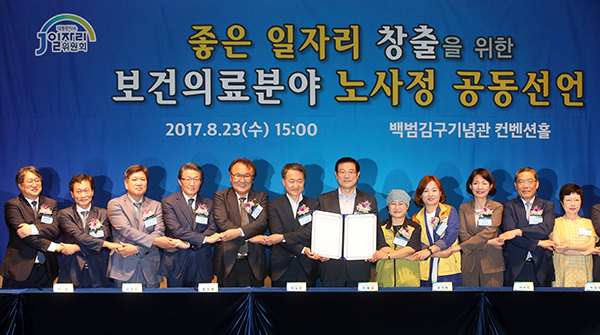
A year ago, the tripartite dialogue in the health and medical sector had received much of the public attention for their successful adoption of a joint declaration to "create good jobs". The joint statement contained "a shared recognition on the importance of jobs in the health and medical sector and a shared commitment to the creation of jobs and the improvement of working conditions".
Both the labor circle and hospitals had reconfirmed their commitment to the reduction of work hours to create good jobs in the health and medical sector and good faith discussions to find out ways to establish the balance between work and family life and to convert the non-regular jobs into regular positions. In support to the bilateral commitments made by the labor unions and hospitals, the government promised to strengthen the legal, institutional and financial basis to manage and assist the workforce in the health and medical sector and to set up a 'special committee in the health and medical sector' within the presidential job commission.
Now, one year later, far from implementing the joint statement, signs of crack are appearing in their stance toward the issues surrounding the creation of jobs in the health and medical sector. The special job committee in the health and medical sector has been thrown into confusion, as each had come up with their own road map which is different each other.
According to the labor circle, the special job committee in the health and medical sector proposed a 'plan to create bio-health jobs' in a meeting held on September 5. According to the plan, bio-health jobs will be increased to 188,000 by 2022, from the current level of 146,000 jobs and additional 10,000 bio-health professionals will be fostered by 2022. In order to achieve the goals set in the plan, the fostering of pharmaceuticals, medical devices and cosmetics industry, the establishment of infrastructure for the development of global innovative medicines, and the creation of successful global models for medical devices will be pursued.
It seems that the job creation plan proposal in the health and medical sector is closely linked with the current policy discussion between the government and the ruling Democratic Party on 'Regulation Free Zone' and the proposed bills to parliament regarding the fostering of the medical device industry and the support for the development of innovative medical devices for which critics raised concerns about the commercialization of medicine.
The plan sparked the strong opposition from the labor circle. The labor unions criticized that the plan will actually endanger the public health and the healthcare system, as if it focuses on the job creation. A union official of the medical solidarity division of the Korean Public Service and Transport Workers' Union argued that "the special committee has not had adequate in-depth discussions in the areas such as the integrated nursing and care service, where large job potential would exist for good quality jobs, but instead the government pushes ahead with the commercialization of medicine, which had been criticized as an indiscriminate deregulation policy driven by the former Park Geun-hye administration".
Labor and several other members of the health and medical sector special job committee also expressed their rages against the proposal which will be submitted before the plenary meeting of the presidential job commission scheduled on September 11 for its deliberation and adoption, without giving the committee members enough time to review the proposal. It is reportedly known that the Korean Confederation of Trade Unions(KCTU) will not participate in the plenary meeting of the presidential job commission on September 11.
reported by Kim Mi-young
translated by Kim Sung-jin

